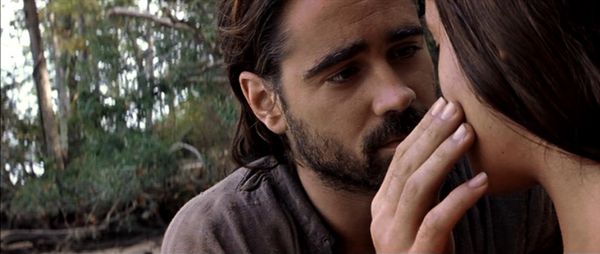Eye For Film >> Movies >> The New World (2005) Film Review
The New World
Reviewed by: Richard Mellor

Seven years after his comeback film The Thin Red Line, Terrence Malick returns to cover a topic with scope to finally match his enigmatic talent. The New World sees him detailing the very formation of America, dissecting the popular Pocahontas myth as his means of doing so. And whether this is a popular yarn positively spun, or a much gloomier meditation about the loss of natural freedom, it is brilliantly delivered and absorbing to watch.
As the native Powhatan tribe of Indians struggle with newly-arrived British settlers in 17th century Virginia, the resident chief's daughter Pocahontas (Q'Orianka Kilcher) and tender explorer Captain Smith (Colin Farrell) fall deeply in love. Neither of their societies approve; soon Pocahontas is traded to the English and Smith summoned home by his king. Slowly adapting to the disciplined lives of the settlers, the abandoned Pocahontas begins to find new happiness with recently arrived farmer John Rolfe (Christian Bale).

Major events in Pocahontas' life are made to mirror the changes happening in America around her. As she is traded, so the Indians seem to somehow cede control of the land, allowing the English to establish themselves. Her two relationships also communicate a shift. With Smith, she ran around in fields and stared with naive eyes at the world; the new life with Rolfe involves farming tobacco and living in a house. It's restrictive, but sensible and honest. This is the new country.
Though he doesn't particularly convince as a grizzly explorer, Farrell puts in a decent performance as the traumatised Smith, whose eternal adoration for Pocahontas is made profoundly, painfully obvious. Bale is efficient and calm as the kind-hearted Rolfe, who battles to claim Pocahontas' heart after Smith moves away. The two never share the screen, yet balance each other well.
But there is no doubting the star of the show. Partly due to her most bewitching smile, Peruvian-born Kilcher is mesmerising as Pocahontas. Gracefully allowing her character to shift from enthusiastic young girl to wearied housewife, she is in turn inspiring, bewildering and iconic. Every possible emotion is covered along the way, without blemish. A dazzlingly bright presence, Kilcher's Pocahontas deserves to be one of cinema's great characters.
She is aided by Malick's thoughtful, zealous direction. Up until Pocahontas' trade, his film is wild and energised. Emmanuel Lubezki's camera spins around in rapture, stealthily stalking through the long grass, or staring with unwavering focus on astonishing landscapes. Natural Virginian sounds compete with James Horner's dramatic music for attention; there is little speech. Malick presents the land just as the magical new frontier must have seemed for those first settlers. And, like it, his film is epic, sprawling and inspirational.
It's also an emotional picture at this stage, more concerned with places and senses than action or plot development. Whether it's the Indians attacking, or the English, it matters not; Malick prefers to focus on the sentiments of his main trio of characters, with dramatic music, pained faces and charged voiceovers. Then, as soon as Pocahontas is taken from her tribe and Smith leaves her, the dreamy feel suddenly ceases, the bubble bursts and the film changes.
It has stiller, clearer scenes, less demanding on the senses; the plot becomes more prosaic and slow-paced. Whereas, in the early scenes, it was hard to know what was occurring on screen; now it is easy - there's more dialogue and more logical scene progressions. The initial fervour is replaced by a stony calm, as if the movie has grown up, or been suppressed, like Pocahontas. As America shifts, so does Malick's film in response.
In the shift, and the way that the lively, naive Pocahontas is so noticeably dulled, you wonder if Malick really believes that a good change took place at all. Yes, the English have great qualities; yes, their society has stood the test of time. But the loss of Pocahontas' liberty and expressive temperament are terrifically obvious in the film's second part; it seems hard to think of that loss other than as a tragedy.
But tragedy or not, Malick's film is a rousing, delicious experience. It has so much to offer; vast, lush scenery, elegant camerawork presenting hugely important historical moments, a sublime soundtrack and a roller coaster, compelling love triangle - and of course its majestic main character.
This is cinema made individually, warmly and skillfully - just, in fact, as it should be.
Reviewed on: 27 Jan 2006

















